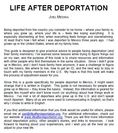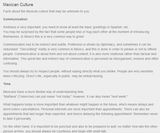Adapting After Deportation
While most of this website is devoted to lists of resources and organizations, there is much more involved with navigating life after detention. People who have been deported might feel many emotions and feel overwhelmed by unfamiliar sights, sounds, and how people act in their new environment, especially if it's been many years since living in that country. This page includes "survival guides" that others have made for helping adapt to life after being deported to specific countries. These guides address things like cultural information, clothing, staying safe in a new or unfamiliar environment, language, more detailed information about how to get around, and more. We cannot confirm that the information is all up to date, but we include these guides here as starting places.
Given the large numbers of people who are deported from the United States each year, the volume of research that inquires into people’s lives immediately following deportation from the United States is quite small. Research that has been conducted on life after deportation indicates significant social and economic consequences of being identified as a “deportee” in another country. These consequences include difficulty finding employment and earning income; a widely held, but inaccurate assumption, of criminal wrongdoing; and social isolation and depression. In the short term, critical concerns include meeting basic needs for shelter, food, and communication.
Given the large numbers of people who are deported from the United States each year, the volume of research that inquires into people’s lives immediately following deportation from the United States is quite small. Research that has been conducted on life after deportation indicates significant social and economic consequences of being identified as a “deportee” in another country. These consequences include difficulty finding employment and earning income; a widely held, but inaccurate assumption, of criminal wrongdoing; and social isolation and depression. In the short term, critical concerns include meeting basic needs for shelter, food, and communication.
Mexico

|
Cambodia

This English language guide was created by The Returnee
Integration Support Center, a non-governmental humanitarian organization
facilitating the integration into Cambodian society of people who were admitted
to the United States as refugees and are being deported to Cambodia. RISC provides assistance with documentation,
employment, housing and referral services. Some additional information has been added about resources for people in the Tacoma, WA area who are being detained at the Northwest Detention Center. For more information about the Returnee Integration Support Center, see: http://www.risccambodia.org/
|
Cultural Background for Newcomers to Mexico

This overview is written for people unfamiliar with Mexican culture. In a few paragraphs, it shares the perspective of one organization, Sin Fronteras IAP, on communication, time, dress, tradition, and social structure.
|
